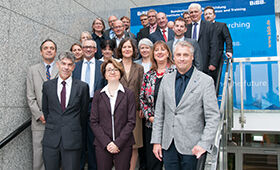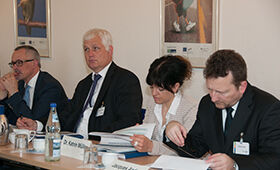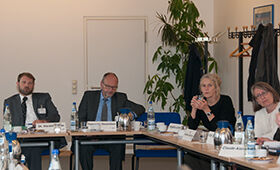Enhancing joint activities
Swiss vocational education and training experts visit BIBB
BIBB received a visit from the Swiss Federal Institute for Vocational Education and Training. Extensive talks conducted by the Swiss and German sides focused on getting to know each other better and on enhancing joint activities.

As is famously stated in Schiller’s play “William Tell”, which links Switzerland and Germany like no other: “'Tis early practice only makes the master”. The Swiss and Germans are also both of the opinion that early learning at school needs to be followed by a number of other stages before mastery is achieved. These include a course of higher education study or vocational education and training. This makes it all the more important that the persons involved with running vocational education and training in the respective countries know one another well and work to enhance the joint activities they undertake.
Against this background, leading representatives from the Swiss Federal Institute for Vocational Education and Training (SFIVET) paid a visit to its partner institute in Germany, the Federal Institute for Vocational Education and Training (BIBB). Presentations from both sides made it clear that the two institutes could already look back upon successful cooperation extending over a period of many years. The first cooperation agreement was concluded in 2007 and extended for a further five years in 2014. The coordinated actions of BIBB and the SFIVET are based on three main pillars. The two institutes engage in project-related cooperation, particularly in the field of research and development. They also participate in councils and network on VET research and practice in the form of contact seminars.

Nevertheless, the aim now was to expand cross-border cooperation still further, and agreement was reached on this point by Prof. Dr. Friedrich Hubert Esser, President of BIBB, and Dr. Philippe Gnaegi, President of the SFIVET Board. Professor Esser emphasised that growing internationalism in vocational training was necessary and appropriate because companies were increasingly seeking staff in possession of international experience and intercultural competence. “The same also applies to medium-sized companies,” he stressed. For his part, Dr. Gnaegi declared that strengthening bridges to external partners was an important part of the “2022 Strategy” of the SFIVET. One very good example of this was the many years of cooperative involvement on the Editing Committee of the BIBB Journal “Vocational Education and Training in Research and Practice” (BWP) on the part of a colleague from the SFIVET.

Further presentations and discussions staged during the meeting centred on questions such as the following. What is the purpose of the SFIVET’s “Observatory for Vocational Education and Training”? What is the status of research cooperation with regard to the costs and benefits of company-based training in Germany and Switzerland? What are the details of the approaches are being pursued by the Swiss and German sides on the international stage and how can the two institutes support each other with regard to implementation? Other items on the agenda included a centre of excellence to look at VET-related trends in a timely manner, practical aspects, recipes for success and internationalisation measures. Further rapprochement between the SFIVET and BIBB can be expected from a workshop aimed at securing the attractiveness of dual training which Dr. Gnaegi and Professor Esser have agreed will take place next year.